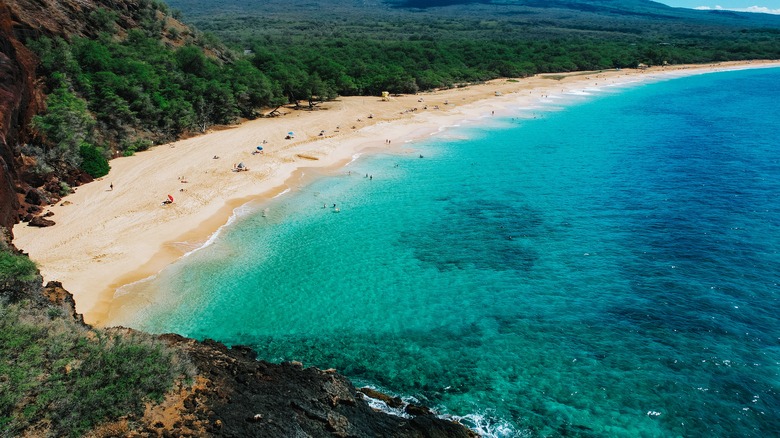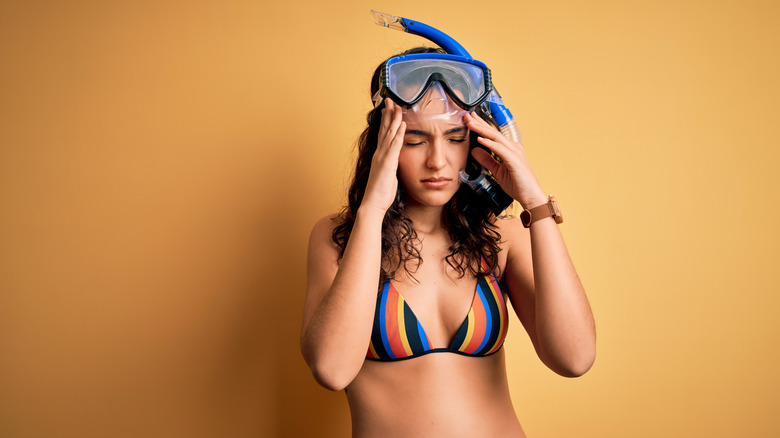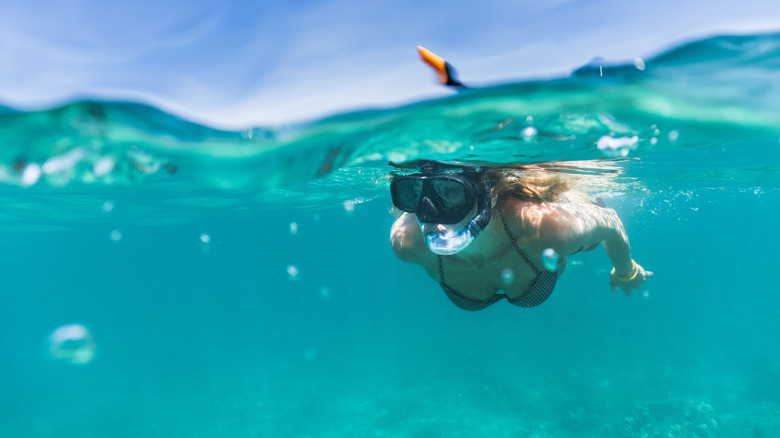One Of The Most Fun Things Tourists Come To Hawaii For Is One Of Its Top Causes Of Death
With gorgeous water and an abundant ecosystem, Hawaii is home to some of the best places for snorkeling in the world. Notable spots include Molokini, Maui, and Poipū Beach Park in Kauai, to name a few. Needless to say, if you visit one of the islands, snorkeling will likely be on your itinerary. Whether you decide to take a guided tour or choose to rent equipment to snorkel at your leisure, there's a distressing trend visitors should be aware of: Snorkelers are dying at an astonishing rate in Hawaii.
KHON2 reported that the state's Department of Health found that out of the 800 drownings that occurred in Hawaii between 2013 and 2022, 30% of victims were snorkelers. Moreover, a majority of them were tourists. Tragically, the snorkeling deaths of tourists in Hawaii have continued since this data was released. In June 2023, a California tourist on his honeymoon drowned on Oahu at Electric Beach while snorkeling. That same month, another California tourist drowned snorkeling in Kauai. In January 2024, an 83-year-old man from Utah drowned during a snorkeling tour in Kealakekua Bay on Kona.
According to a 2023 article from KITV, the most snorkeling deaths in Hawaii between 2013 and 2023 occurred at Hanauma Bay in Oahu. Although the cause of these snorkeling drownings in Hawaii has been unclear, a Snorkel Safety Study revealed shocking information.
What is SI-ROPE?
The Hawaii State Department of Health created the Snorkel Safety Sub-Committee, and in 2021, they released their Snorkel Safety Study. This concluded that Hawaii's snorkeling deaths could be caused by Snorkel Induced Rapid Onset Pulmonary Edema (SI-ROPE). What does this mean? Instead of drowning from breathing in water, SI-ROPE victims drown while snorkeling because they are unable to get enough oxygen. Experts like Colin Yamamoto, Maui's former battalion chief of ocean safety, told KHON2 that the design of snorkel masks may also be to blame for this.
"There is a lower level of oxygen and a higher level of carbon dioxide when you're snorkeling," Yamamoto said. "Anytime you exhale, that snorkel is all filled with your exhaled air; so, your next breath, you're going to breathe in that exhaled air. So, that's why you have a lower level of oxygen and a higher level of carbon dioxide."
What happens to individuals who experience SI-ROPE? First, they'll feel breathless, and as they realize something is wrong, they'll pass out. Perhaps even more frightening is that this can occur without anyone nearby realizing anything is wrong; the process is swift and not as apparent as a traditional drowning.
Stay safe with these snorkeling tips
The Snorkel Safety Study found that certain participants were more likely to develop SI-ROPE. Speaking to KHON2, pulmonologist Dr. Samuel Evans explained. "The study showed they had some form of pre-existing cardiac condition, maybe high blood pressure and ventricle less compliant; so, this diastolic heart failure was associated with a lot of these drownings, mostly in middle-aged men," he said. In addition, those who travel by air to Hawaii may also be susceptible to SI-ROPE.
To prevent SI-ROPE, the Snorkel Safety Study states that if you're unsure if you have pre-existing heart conditions, don't snorkel. The same can be said if you don't know how to swim. Having trouble breathing as you snorkel? Stop the activity immediately. Likewise, never snorkel alone. As a general rule, before you snorkel, one precaution you should take is to also ensure your mask fits correctly. Of course, you never want to be breathing in water.
If it's your first time, you never want to be too far from a lifeguard or an instructor if you're on a tour. If you start feeling faint, these individuals can help get you to safety and medical aid. Also, when snorkeling solo, stay close to shore, and if you've just flown into Hawaii, perhaps hold off on snorkeling for a bit. To learn more, check out these mistakes to avoid when snorkeling for the first time.


